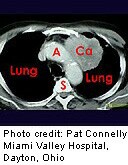
MONDAY, Nov. 10, 2014 (HealthDay News) — Annual lung cancer screenings for long-term smokers may soon be covered by Medicare, the U.S. Centers for Medicare and Medicaid Services (CMS) announced Monday.
The reimbursement proposal would cover annual CT scans for people aged 55 to 74 with a smoking history of 30 pack-years who still smoke or who quit within the last 15 years. Pack years are determined by multiplying the number of packs smoked daily by the number of years a person has smoked.
Private insurers will also be required to cover lung cancer screenings for this group of people starting in 2015, the result of a recommendation issued almost a year ago by the U.S. Preventive Services Task Force. The task force is an independent panel of experts that advises the federal government on health policies.
Advocacy groups and experts hailed the Medicare decision.
“The American Lung Association applauds Medicare for this lifesaving announcement,” Harold Wimmer, national president and CEO of the lung association, said in a statement. “Today’s proposal by Medicare will save lives, increasing the low survival rates associated with lung cancer, our nation’s leading cancer killer.”
A leading researcher in lung cancer screening also welcomed the move.
“We applaud the CMS coverage decision that provides CT screening for older smokers at high risk of lung cancer,” said Dr. Claudia Henschke, director of the lung cancer screening program at the Icahn School of Medicine at Mount Sinai, in New York City. “We are grateful that they listened to our suggestions, and this will lead to saving many lives. We started this research more than 20 years ago, and have been working on it ever since.”
Henschke was the principal investigator of the Early Lung Cancer Action Project; their research was first published in 1999.
Meanwhile, the Lung Cancer Alliance said the federal government “got it right” with the new proposal.
“Tens of thousands of lives will be saved by providing America’s seniors with fair and equitable access to the same lifesaving lung cancer screening that is now being offered to those with private insurance,” said Laurie Fenton Ambrose, president and CEO of the alliance. “Now we will focus our attention on making sure those who would benefit most from this screening actually get screened.”
Medicare will require people to undergo smoking cessation counseling or counseling on the importance of staying smoke-free prior to receiving the annual scan.
The agency will also require that:
- Participating radiologists have solid experience in reading and interpreting CT scans for possible lung cancer.
- The CT scans occur at a radiology imaging center with experience in lung cancer screening or accreditation as an advanced diagnostic imaging center.
- Participating centers submit data on all CT screening findings, follow-up and patient outcomes.
A federally funded clinical trial, the National Lung Screening Trial, concluded four years ago that annual CT scans could reduce lung cancer deaths by 20 percent in older, long-time smokers. The results were based on the screening of more than 53,000 current or former heavy smokers aged 55 to 74.
Despite those findings, the federal government did not act immediately. Cost is a major factor in the screenings; a study published earlier this year reported that lung cancer screening could cost Medicare $9.3 billion over five years, which amounts to a $3 per month premium increase for every Medicare patient.
The public will be allowed to submit comments to Medicare in response to the proposal until Dec. 10. A final announcement is expected next February, at which time coverage for Medicare beneficiaries will begin, according to the American Lung Association (ALA).
Lung cancer remains the leading cancer killer in the United States. According to the ALA, over 159,000 Americans will die of the disease in 2014, and lung cancer now makes up 27 percent of all cancer deaths.
More information
For more on the draft proposal, visit the U.S. Centers for Medicare and Medicaid Services.
Copyright © 2026 HealthDay. All rights reserved.

